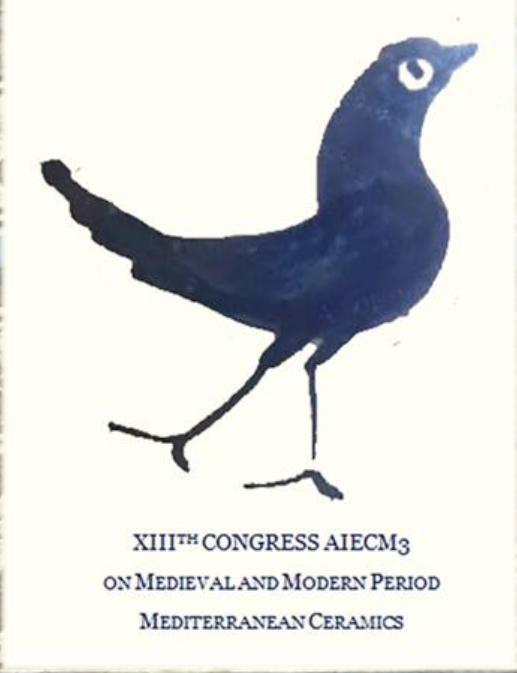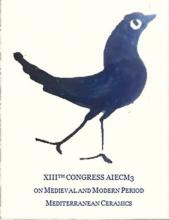
The XIIIth Congress on Medieval and Modern Period Mediterranean Ceramics of AIECM3 organized by Universidad de Granada, Servicio de investigación de la Alhambra, Unidad de Excelencia de la Alhambra and Fundación Fajalauza; on 8-13 November 2021. AIECM3 is an international association for the study of medieval and modern pottery in the Mediterranean. It organizes the International Conference (CICM3) every three year and also programs innovative thematic workshops.
The work of the association has been essential for new achievements and significant reflections about history of pottery. The Congress of AIECM3 to be held for the first time in Granada proposes to continue with the lines of research that emerged from previous international congresses, in addition to emphasizing discussion and debate.
See the program on the conference website, watch the videos of the oral communications, see some of the posters.
1. Sessions
Ceramic production and technology.
Contributions dedicated to production and technology reconstruction. Proposals on raw material processing, organization of productive spaces and technological choices. Studies on specific productive topics such as archaeological interventions or specific collections are welcome. Also comprehensive research, such as territorial and cultural analysis.
Ceramic consumption patterns.
Contributions dedicated to the reconstruction of the use of ceramics in medieval and post-medieval societies. For instance interpretations of the way in which consumers accept and negotiate trends in their temporal, social, geographical context, etc. It is encouraged to present analysis using different kind of sources, including material or written sources, ethnographic approaches and reflections on quantitative aspects among others.
Social significance of ceramic productions.
Social groups can use artifacts as a way of expressing different aspects, such as identity. The functional analysis of ceramics is also an ideal ally for the interpretation of its symbolic meaning. In summary, contributions that discuss different registers of medieval and post-medieval daily life through ceramic analysis are welcome.
Theory and method in the study of medieval and modern ceramics.
Any kind of reflection at an empirical, theoretical and methodological level. As well as to share new approaches in the analysis of medieval and post-medieval ceramics. Also approaches that cannot be covered with conventional or traditional techniques: new archaeometric approaches or methodological reflections on the use of digitization to give an example. Contributions from different disciplines that enrich the discussions are more than welcome.
New discoveries.
This session includes those works focused on new research, findings and specific discoveries. Also workshops or unknown and new ceramic productions.
2. Call for papers
Oral presentation. Communications will have a maximum duration of 20 minutes followed by a 10-minute discussion.
Poster. Specific investigations will have a place as posters. The posters will be presented on vertical DIN A0 (1.20 x 0.84 m). They will be integrated into the sessions where they will have a 10-minute presentation and discussion space.
The International Committee begins the process of receiving proposals for communications and posters from now until January 31, 2021. The final selection of contributions will be made by the International Committee, in order to prepare and harmonize the sessions.
Proposals must include title, author's name, e-mail, institutional affiliation and abstract (300-400 words). The type of participation (oral communication or poster) and the session in which you want to participate must be specified. The International Committee may reorient the mode of participation of the proposals.
Proposals must be sent to the President of the Association (Sauro GELICHI: gelichi@unive.it) and one of the members of the National Committee to which the proponent belong.
National committees:
- Spain
- Sergio ESCRIBANO RUIZ
- E-mail: sergio.escribanor@ehu.es
- Alberto GARCÍA PORRAS
- E-mail: agporras@ugr.es
- Manuel RETUERCE VELASCO
- E-mail: manuretu@ucm.es
- Sergio ESCRIBANO RUIZ
- France
- Henri AMOURIC
- E-mail: amouric@mmsh.univ-aix.fr
- Jacques THIRIOT
- E-mail: thiriot@mmsh.univ-aix.fr
- Lucy VALLAURI
- E-mail: vallauri@mmsh.univ-aix.fr
- Henri AMOURIC
- Italy
- Margherita FERRI
- E-mail: ferri@unive.it
- Sauro GELICHI
- E-mail: gelichi@unive.it
- Alessandra MOLINARI
- E-mail: alemoli@fastwebnet.it
- Margherita FERRI
- Maghreb
- Aïcha HANIF
- E-mail: aicha.hanif@hotmail.com
- Aïcha HANIF
- Byzantine World
- Platon PETRIDIS
- E-mail: ppetrid@arch.uoa.gr
- Yona WAKSMAN
- E-mail: yona.waksman@mom.fr
- Platon PETRIDIS
- Portugal
- Susana GOMEZ
- E-mail: sgm@uevora.pt
- André TEIXEIRA
- E-mail: texa@fcsh.unl.pt
- Susana GOMEZ
- Middle East World and Ottoman
- Roland-Pierre GAYRAUD
- E-mail: rp.gayraud@gmail.com
- Filiz YENISEHIRLIOGLU
- E-mail: fyenisehirlioglu@ku.edu.tr
- Roland-Pierre GAYRAUD
3. AIECM3 Awards
In order to encourage the participation of young researchers (under 35 years of age), the AIECM3 Awards will be launched, which will highlight the most interesting research from each session.
4. Other information
The selection of proposals will be communicated at the end of March 2021 (this second circular will anounce acepted proposals). The third circular will be published in early May 2021 with the preliminary program and practical arrangements for arrival in Granada and accommodation.
Congress will be held on 8-13th November 2021.
For questions: infoaiecm3gr@gmail.com
Download the first circular



